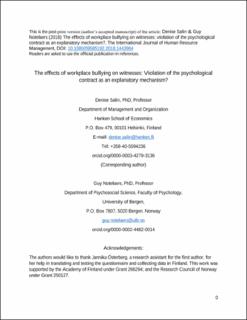The effects of workplace bullying on witnesses: violation of the psychological contract as an explanatory mechanism?
Journal article, Peer reviewed
Accepted version
Permanent lenke
https://hdl.handle.net/11250/2762733Utgivelsesdato
2020Metadata
Vis full innførselSamlinger
Originalversjon
International Journal of Human Resource Management. 2020, 31(18), 2319-2339 10.1080/09585192.2018.1443964Sammendrag
This study analyses the effects of witnessing workplace bullying on employee attitudes and well-being. Furthermore, the study seeks to extend our understanding of why bullying may result in negative outcomes for witnesses, by studying violation of the psychological contract as an explanatory mechanism. The paper draws on two survey studies conducted in Belgium (n = 1473) and Finland (n = 1148). The results show that witnessing bullying affects work-related attitudes, but not necessarily stress outcomes, when controlling for witnesses’ own experiences of bullying. Experiences of bullying on the part of the witnesses themselves are seldom controlled for in witness studies, thus possibly leading to false positive results. Furthermore, the study finds support for the role of psychological contract violation in explaining the relationship between witnessing bullying and poorer employee attitudes, thus contributing to our understanding of the mechanisms behind witnesses reactions. That witnesses perceive a psychological contract violation suggests bullying affects the employee-organization relationship not merely for targets. Overall, the results demonstrate bullying has effects beyond the target-perpetrator relationship and thereby further highlight the need for organisational action to reduce the risk of bullying.
